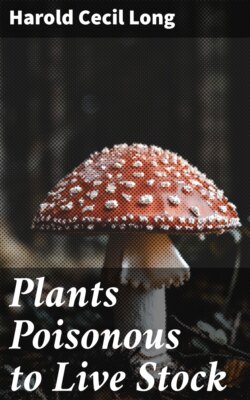Читать книгу Plants Poisonous to Live Stock - Harold Cecil Long - Страница 7
На сайте Литреса книга снята с продажи.
CRUCIFERÆ.
ОглавлениеTable of Contents
Charlock (Brassica Sinapistrum Boiss.), also known as B. Sinapis Visiani and Sinapis arvensis L., may be regarded as harmless in the young state, but liable to cause injury after flowering, when the seeds have formed, when it may occasion serious accidents if eaten by live stock. A case in which rape cake containing the seeds of charlock caused poisoning was recorded in 1875 (Jour. Roy. Agric. Soc.). The seeds only are dangerous.
Toxic Principle. The seeds contain minute quantities of volatile Oil of Mustard or Allyl-isothiocyanate (C3H5NCS), the alkaloid Sinapine (C16H23NO5), and the alkaloidal glucoside Sinalbin.
Symptoms. Ingestion of the seeds may cause inflammation of the stomach and intestines (with loss of appetite, wind, colic, and diarrhœa); inflammation of kidneys (difficult, excessive or bloody urination); and nervous symptoms, with great exhaustion, uncertain gait, paralysis of limbs and in isolated cases convulsions (Müller).
Pott also records increased salivation.
In the horse Cornevin records great depression, difficult and accelerated respiration, yellowish mucus and convulsive cough. A characteristic symptom is the emission of frothy liquid through the nostrils (as much as 10 litres in one hour). Death often occurs from asphyxia in a fit of coughing.
In cattle, cake containing the seeds caused inflammation of the intestines, exhausting diarrhœa, and unquenchable thirst.
The cultivated Mustards may induce similar effects, and Lander records the following symptoms as caused by Brassica nigra:—In the horse, bronchial symptoms, marked by difficulty in breathing and the discharge of great quantities of yellowish frothy matter from the nose; in cattle, uneasiness, restlessness and intense colic, with frantic rushing about and mania, ending in exhaustion, falling, struggles and collapse; in a recent case there were dullness, coldness, some tympany, laboured respiration, staggering and falling, and in fatal cases, immobility and a semi-comatose condition.
REFERENCES.
4, 16, 63, 76, 127, 170, 190, 205, 213, 219.
Wild Radish (Raphanus Raphanistrum L.). As in the case of charlock, the seeds of wild radish are very acrid, and susceptible of introducing intestinal troubles if eaten by animals when mixed with cereals.
Garlic Mustard (Alliaria officinalis Andrz.) and Treacle Mustard (Erysimum cheiranthoides L.). The seeds are stated to have properties similar to Brassica Sinapistrum (p. 18) owing to a pungent oil; and when eaten in quantity to induce poisoning, inflammation of the digestive tract and of the kidneys, as well as nervous symptoms (Müller).
